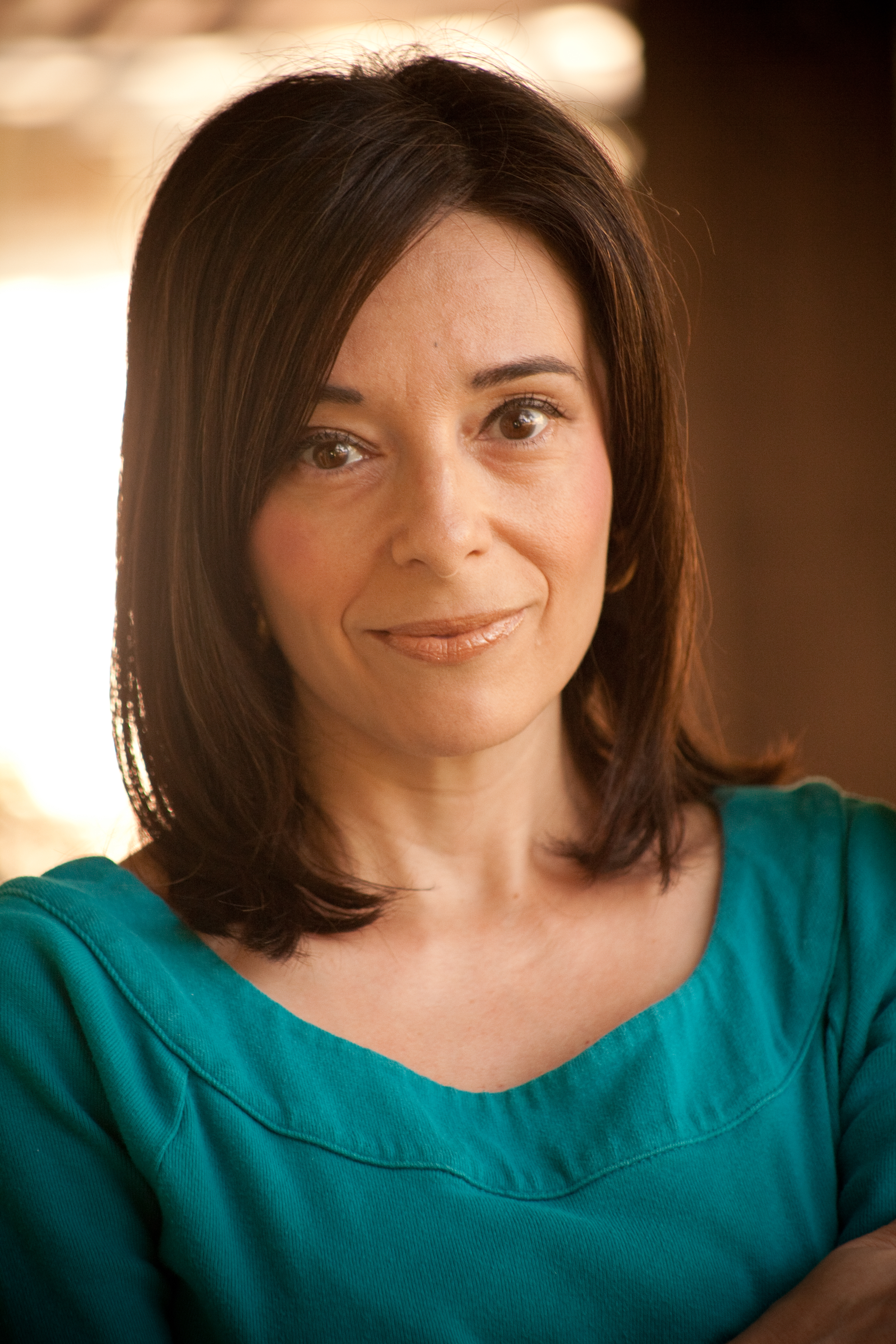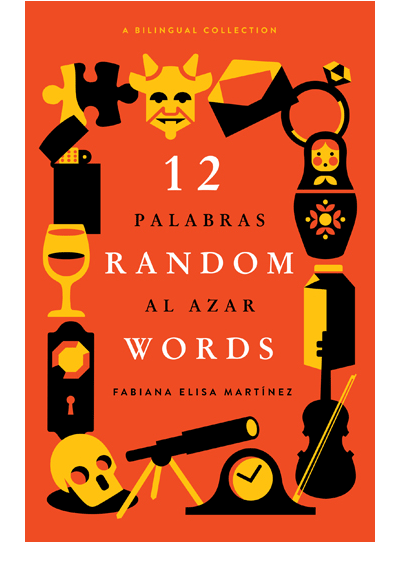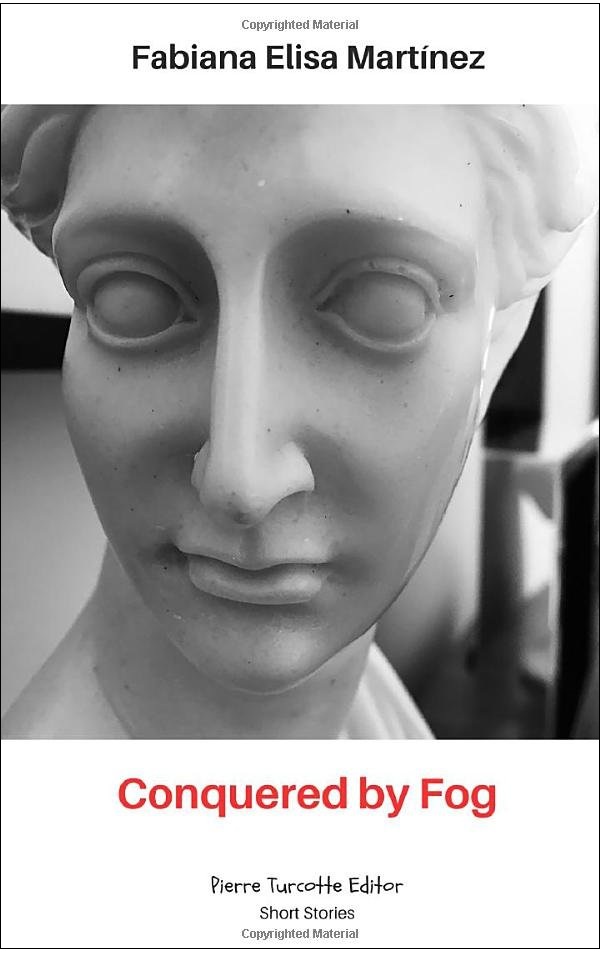Today I interview an author who writes first drafts like nobody else. Read further to hear about her unique process. I met Fabiana Elisa Martínez at an Afternoon with Authors event at a local bookstore. A polyglot, she doubted her writing abilities at first, but started with one-word prompts and crafted stories that have won numerous awards. Here’s her bio:
Bio
Fabiana was born and raised in Buenos Aires, Argentina. She graduated from UCA University in Buenos Aires with a Linguistics and World Literature degree. She is a linguist, a language teacher, and a writer. She speaks five languages: Spanish, English, French, Portuguese, and Italian. She has lived and worked in Dallas, Texas for more than twenty years. She is the author of the short story collection 12 Random Words, her first work of fiction, the short story “Stupidity,” published as an independent book by Pierre Turcotte Editor, the collection of short stories Conquered by Fog, also published by Pierre Turcotte, and the grammar book series Spanish 360 with Fabiana.
12 Random Words, in its three bilingual versions, has won ten awards, and two of its stories were selected to be read in February 2017 as part of the Dallas Museum of Art’s distinguished literary series Arts & Letters Live. The book was also among the six finalists of the Eyelands Book Awards 2022 and won first prize.
Six months after publication, Conquered by Fog became a finalist in the 2023 Global Book Awards, the 2023 Eyelands Book Awards, the Independent Author Network Award, and the Royal Dragon Fly Book Awards.
Her short story “Characters” received the Second Place Award in the Fiction for Adults Category in the 2023 Annual Abilene Writers Guild Contest.
Interview
Poseidon’s Scribe: How did you get started writing? What prompted you?
Fabiana Elisa Martínez: In 2014, invited by a friend who believed in me more than I did, I accepted joining a virtual writing group. I wasn’t sure that I could write fiction in English, or at least quality fiction. Reading is easier; I can read in five languages and always try not to read two books in the same language consecutively. However, I tried, and every month, I wrote a short story based on a random word the group organizer sent.
Magically, some of those stories became a book, my first book, called 12 Random Words. It was published in 2016, and it has been one of the best experiences in my life. Because from the fiction of those stories came an immense number of really beautiful events that enriched my life even more.
P.S.: Who are some of your influences? What are a few of your favorite books?
F.E.M.: My life is shaped by literature and languages, so for someone who reads every day, it’s quite difficult to choose just a few books or authors that have influenced me, maybe not my writing, but the way I see the world. Of course, I have my favorite writers. I might be a little biased here, but I love Borges, Cortázar, Javier Marías, and Mario Vargas, to mention some titans of the Spanish language. In English, I love Jonathan Coe and Julian Barnes. In French, I admire Michel Houellebecq. In Portuguese, Jorge Amado and Carlos Campaniço. I admire for sure any writer who can make the reader turn pages with passion and curiosity, no matter the genre or subject. Ultimately, there are not as many subjects, but endless ways to discuss the few deep passions that human beings share: love, jealousy, hatred, fear, and rage.
P.S.: Regarding your book 12 Random Words, (with four marvelous story-linked videos on your website), how did that book come to be and what is it about?
F.E.M.: The videos that illustrate my book can be seen on my website and were conceived by my friend, editor, and movie director, Quin Mathews. We traveled all the way to New York City to film them. It was a wonderful adventure and a great way to make literature tangible.
As I mentioned earlier, the 12 stories in the book were inspired by a random word I was given, and I couldn’t dispute it. I leave it to the reader the freedom to connect those stories. Like any short story collection, the stories may be related beyond the writer’s conscious choice. Many times, readers come to me to comment on characters that appear in different stories and seem to them related in some way. I never tell a reader that their perception is incorrect. It’s exactly the opposite; the reader is always right, and I love to listen to the infinite hues and angles through which they can view a story. I believe that is the magic of literature: the solitude of the writer and the boundless interpretations of the readers.
P.S.: Which came first—your writing, or learning five languages? How have each of those abilities affected the other, if at all? (Aside from the fact that you got 12 Random Words published in 3 different languages.)
F.E.M.: Since I grew up in a bilingual family (Spanish at home and Galician at my grandparents’ house), I don’t have a conscious memory of learning a language. In kindergarten, teachers were already speaking English to me. Later in life, I chose to study literature and additional languages in college, which provided me with the opportunity to earn degrees in Latin and Ancient Greek, which opened the doors to other languages. I have been in love with French for many decades. I speak English at home and teach mostly Spanish, but French is the language I consider my private linguistic room. Like Virginia Woolf’s room but made of words. So, when I was initially writing the stories of 12 Random Words in English (and I want to make this very clear: I wrote all those stories in English from scratch, and that’s the only language I have written fiction in so far), it was only logical to make the first book bilingual in English and Spanish. The other two followed along—English and French, and English and Portuguese.
P.S.: For your book Conquered by Fog, what connects the twelve short stories in it? How does the cover image of a female Greco-Roman statue represent them?
F.E.M.: Again, I think these are questions that the readers might answer with a more interesting perspective. From my perspective, the stories reveal different aspects of the human condition at various ages and stages. I think all these characters look for deep connection, understanding, and love, which is what makes us human. My deepest conviction is that we humans are more similar to one another than different from each other: we all yearn to be loved, and we all dread dying alone. The cover of the book is also a picture taken by my friend, Quin Mathews, and it reflects the character of some of the stories, as well as their classical symbolism. It also illustrates the title of the book, which is the same as the title of the very last short story in the collection. But again, readers know better. We should ask them.
P.S.: We heard that you write in the dark. Is that true? How does that work and why do you do it?
F.E.M.: Yes, I have a peculiar ritual. Whenever I start writing a short story, I turn off all the lights. I close all the shutters and switch off every single monitor. I close my eyes and start writing frantically. My brain works in a different dimension at that moment, perhaps closer to a meditative state; I’m not sure. I only open my eyes when I feel that the story has reached a mature stage. Sometimes 40 minutes pass, sometimes an hour, but when I open my eyes, I know I have something of relative value in front of me, something imperfect but solid that needs to be properly corrected. That’s the second stage of my writing, and of course, it is done with the lights on.
P.S.: Some say I’m in the dark about writing, but they mean it figuratively. Moving on. You’ve titled a short story “Stupidity,” and gotten it published as a standalone book. What prompted this story, and what is it about?
F.E.M.: Stupidity was a given word I had to write about many years ago. It tells the story of an older lady who attends the funeral of someone she loved for decades. However, even at funerals, people can uncover new mysteries about those they thought they knew very well. Interesting surprises can emerge even at funerals.
P.S.: Where do you get the ideas for your stories?
F.E.M.: That’s easy. Ideas are everywhere. I feel inside myself, but also listen and observe. I have always thought of writers as very efficient antennas. People who know me are aware that whatever they say, remember, do, or complain about may end up in some of my writings. Ideas are like subjects. They are limited. It’s how we handle dilemmas, temptations, sadness, and passions that matter. So, I’m very fortunate to be surrounded by a constant flow of literary triggers.
P.S.: Two of your other books, Spanish 360 with Fabiana: Transcripts and Exercises – Podcasts 1 to 25 and the companion book for Podcasts 26 to 50 seem designed to teach the Spanish language to English speakers. How do these books differ from other methods of learning Spanish?
F.E.M.: Since my life is a blend of languages and literature, Spanish 360 with Fabiana is a project that aligns with my passion for teaching languages. The two books are transcriptions of our 50 podcasts, which are available for free on most platforms. The advantage of the books is that, in addition to the transcripts of each podcast, there are thousands—literally thousands—of footnotes explaining grammatical aspects not discussed in the podcasts but related to their dialogues and descriptions. Additionally, after each transcription, there are complementary exercises to practice the specific topics covered in each podcast.
P.S.: Reviews of your books on Amazon praise your writing style. One said “she paints with words” and another said of you, “she carries a museum in her head.” Another reviewer wanted to take a highlighter pen to each sentence. How would you describe your writing style and how it differs from other writers?
F.E.M.: Thank you very much for reading those immensely generous reviews. I’m not sure I’m the right person to describe my style, as my perspective is too close to reality. But what I do know is that I don’t want to write in a transparent way; I want to offer the reader some poetic mystery to decipher, not in the sense of a murder mystery but in the way we understand a poem through the magic and rhythm of words, metaphors, alliteration, and images. I don’t want to produce an easy text; I want to give my readers stories that I would love to read, texts that would be completed through the act of reading. Sometimes I worry that some readers don’t want to work too hard, but perhaps those are not the ones I write for. I believe literature is the only admirable lie—the biggest lie that hides the deepest truth.
P.S.: To say you’re an award-winning author is to understate the matter. It takes longer to list your awards than to list your books! Congratulations on winning all of them, by the way. Please choose one and tell us about your experience in winning the award.
F.E.M.: It’s difficult to choose from one of those awards because every one of them has given me in men’s happiness.
One of the best days of my life is not related directly to an award but to an event that felt like it. In February 2017, two stories from 12 Random Words were read at the Dallas Museum of Art by actress Constance Parry at an Arts and Letters Live Event recognizing Texan writers. Not only were my words, forged at home in silence with my cat on my chair, now in the voice of a talented actress, but I was also considered a Texan writer!
However, regarding awards, one that is close to my heart is the Eyelands Book Award, which 12 Random Words received in 2022. This is an international prize awarded in Greece, and the book was selected from among other short story collections by writers I admire. Every time I see that little tree-like, Greek clay sculpture on my desk, I’m reminded of how fortunate I am and how generous the literary world can be.
P.S.: What is your current work in progress? Would you mind telling us a little about it?
F.E.M.: I am working on what I think could be a novel. We will see. I would say that right now, it’s going to be more like a quilt novel or a story divided into short vignettes that will compound a map of a bigger, deeper narration. If you can imagine a Cubist piece of art, one of those paintings by Juan Gris or Georges Braque, it will be something like that, but with words. Like an atomized story shown through all those little shards of moments in time.
Poseidon’s Scribe: What advice can you offer aspiring writers?
Fabiana Elisa Martínez: My advice is very simple, although I am fully aware that I lack the authority to give any advice. However, if you want to write literature, first read a lot, then sit down and write. There’s no better class and no better teacher than a good book and a skilled writer (and sometimes a bad book that teaches you how not to write). There is no powerful writing class that can force you to write what is in your heart. There are no courses or literary gurus. In the end, it is always you and how brave you are in front of the blank page. Sit down and write. You will be surprised.
Poseidon’s Scribe: Thank you, Fabiana. I believe your advice will inspire that kind of bravery in others.
Readers can find out more about Fabiana Elisa Martínez at her website, on Facebook both here and here, on Instagram both here and here, on X, on Goodreads and on her Amazon page.






What an inspiring journey! Fabiana Elisa Martínez’s passion for language and storytelling shines through her creative process and multilingual depth are truly remarkable. A must-read for anyone who loves the art of writing.
Thanks for visiting my website, Nicholas! I agree with you about Fabiana. A remarkable writer, and a joy to interview.